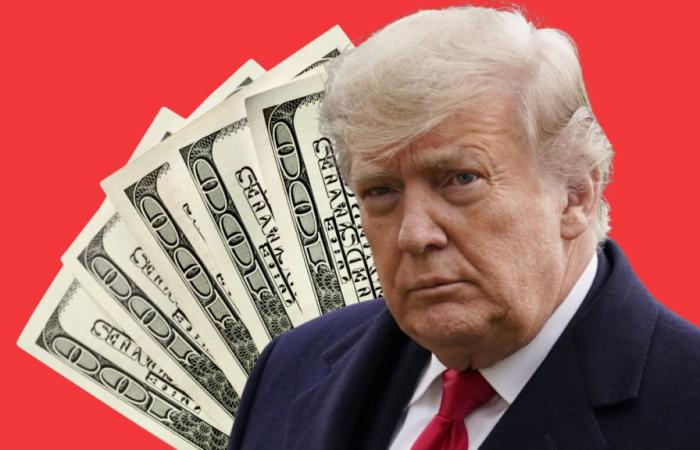The tariffs Trump wants to impose will reduce international trade.images: getty, montage: watson
Trump’s threat to impose new tariffs is already having significant consequences even before he takes office. In the longer term, its customs policy could reduce international trade, according to explanations from specialists at Oxford Economics.
Ann-Kathrin Amstutz / ch media
During the election campaign, Donald Trump announced that “customs” is his favorite word. The ex-president thus scared the world markets even before returning to the White House. If Trump follows through on his threat to impose high new tariffs on imported goods, international trade will be seriously affected. And it is precisely this scenario that carriers around the world are preparing for.
Although Trump is infamous for his unpredictability and the exact amount of the tariffs remains to be determined, many observers and analysts see them as a central part of his economic policy. And the latter himself has often indicated what he intended to obtain with these rights.
On the one hand, Trump wants to strengthen the American economy and fill government coffers to finance, for example, new tax cuts for businesses. On the other hand, and this is undoubtedly even more important, it can thus exert political pressure. This was stated by German economic expert and professor at the University of California Ulrike Marmendier on the radio Deutschlandfunk.
“He realized the power he can wield over other countries by imposing tariffs – either to punish them if something doesn’t suit him, or to push them to make certain decisions”
Ulrike Marmendier, German economic expert and professor at the University of California
The three main trading partners of the United States are in the crosshairs: the surcharge on goods from Mexico and Canada must be 25%. And on imports from China, Trump wants to demand another 10% more, on top of all the already existing customs duties. During the election campaign, he even talked about going up to 60% on Chinese goods and 20% on imports from all other countries.
Price escalation to be expected
This would drive up prices: not only for foreign companies delivering goods to the United States and for American companies importing goods, but also for consumers. Companies would inevitably have to pass on the increase in production costs to them. Business enterprises around the world are seeking solutions to mitigate these developments.
“There is a lot of uncertainty and that makes management more difficult,” says Stefan Legge, lecturer at the University of St. Gallen and expert in international trade. According to him, we must make decisions today without knowing the rules to come. In this context, good risk management is important to best position yourself for the years to come. However, there are a few companies that “want to make their mark quickly again”.
They do this, for example, with a practice known as “frontloading.” In the logistics sector, this means that those who have the necessary storage space are now trying to bring forward as many deliveries as possible – before Trump’s tariffs are implemented. This effect already began shortly after the electoral decision, as various analysts observe.
Goldman Sachs specialists already wrote in November that commercial traffic in Chinese ports had increased since the election. In addition to Chinese exporters, Canadian and Mexican companies have already started shipping shipments earlier, according to the Financial Times.
According to estimates from the freight analysis platform Xeneta, frontloading is even more frequent than in 2018, when Trump imposed new customs duties during his first term. At the time, he introduced the customs duties in several installments. Each cycle concerned specific products. But this time, we risk experiencing the disaster scenario: all customs duties could be applied simultaneously and shortly after Trump takes office.
This is why more companies will certainly engage in “frontloading” – although it seems like a poker move. Because we want to avoid additional customs expenses, but we must first accept additional costs.
First, in the short term, increased ship occupancy rates lead to higher global freight prices. Next, companies must increase their storage capacities – which means costs for goods that remain in stock. And third, they have to plan for the longer term, which increases uncertainty. They may fill their warehouses with goods that consumers ultimately won’t want to buy.
Threat of worsening trade war
If Trump follows through on his threats, it could reduce international trade overall. Specialists at Oxford Economics estimate that Trump’s tariffs will reduce the value of global trade by more than 7% by 2030 compared to predictions made before his election. The trend of weakening globalization, also known as “slowbalization,” would be strengthened during Trump’s second term.
China is expected to be particularly affected. Indeed, according to the Reuters news agency, the country exports $500 billion worth of goods to the United States each year.
The Beijing regime will not accept new tariffs so easily. Already in 2018, China reacted by imposing its own customs duties on American imports. This has increased pressure on global trade and, according to Xeneta experts, this could be repeated in the coming months. The threat of a worsening of the trade war looms.
And Switzerland?
Should we also expect higher prices in Switzerland? According to Stefan Legge, this will depend on the exact form that US trade policy takes.
“If the United States imposes high tariffs on many imports from China, some Chinese exporters will also seek new markets for their products”
Stefan Legge, lecturer at the University of St. Gallen and international trade expert
This could represent a challenge for Swiss producers, but “a temporary advantage” for Swiss consumers.
Every major intervention in the international trading system sets off a chain reaction – with uncertain consequences. “I would not like to make any predictions today about the final impact of all this on Switzerland,” says Legge. But for him, it is clear that Switzerland, as a small open economy, does better with international trade as free as possible than with protectionism.
And how would businesses that participate in international trade respond to Trump’s tariffs? One solution could be to relocate production from China to other countries. But this takes time and costs money. Additionally, according to Xeneta, many companies would be reluctant to give up the competitive advantages they have gained through a well-established production and trade infrastructure in China.
Rather, another option could be put forward:
“Traders avoid customs duties by bringing their goods into the United States via third countries. This already happened during Trump’s first term.
Mari Pangestu, former Indonesian Minister of Commerce
Chinese goods were thus diverted via Vietnam, Indonesia and Taiwan. Such tariff evasion is unlikely to please Trump. According to Pangestu, such third countries as Vietnam and Taiwan could now be targeted more – and should also expect trade barriers. (aargauerzeitung.ch)
Translated from German by Anne Castella.






